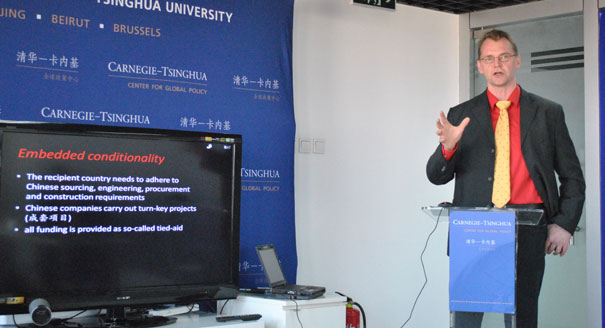Registration
Thank you!
You will receive an email confirming your registration.
IMGXYZ4252IMGZYXConditionality poses the most significant difference in how aid is given by Western nations and China. The current Western-dominated international lending system is characterized by conditionality, wherein recipient nations must meet prerequisites in order to receive aid. Aiming to attract developing nations, China adopted a policy of no political preconditions for receiving aid. Tensions over these different aid approaches have resulted in competition for political and economic influence over developing countries.
Carnegie-Tsinghua’s Sun Xuefeng hosted a roundtable discussion with Matti Nojonen and Mikael Mattlin from the Finnish Institute of International Affairs on the issue of conditionality in Chinese lending. They were joined by several other international experts.
Changing Dynamics in International Aid
- Status Quo Dominated by the West: For many decades, several panelists pointed out, international aid and lending have been dominated by Western institutions and standards. The main characteristic of Western aid has been conditionality. Multilateral organizations, they added, demand specific economic reform measures in order for nations to receive aid, and these certain conditions align with standards that are distinctive to the “Washington consensus.” The European Union also has indirect conditionality based upon membership requirements; in this case the conditionality is not directly attached to lending but is still present, they said.
- China’s Alternative: Unlike Western institutions and bilateral aid agreements, China claims it does not attach political preconditions for aid and loans. However, experts said that upon closer examination, one may easily conclude that China does in fact subject recipient nations to certain conditions and requirements, but this conditionality differs from that of Western nations and institutions. China’s growth and increasing role as a donor nation has placed pressure on these principles of non-interference and non-conditionality, and it may be unrealistic for China to adhere to these principles in the long run, as codependency is created between China and its aid recipients, they added.
Four Conditions of Chinese Aid
A panelist said that China’s aid lending usually comes attached with four oft-overlooked conditions.
- Political Conditionality: In order to receive aid and loans, the recipient nation must adhere to the one-China principle and cannot have official ties with both mainland China and Taiwan. In 2006, Vietnam invited Taiwanese officials to the APEC meeting and China retaliated by cutting off Vietnam’s funding.
- Embedded Conditionality: Any recipient nation of Chinese aid must agree to use Chinese labor and resources, and also adhere to regulations put in place by the Chinese enterprises. Only a small percentage of domestic labor and capital are able to be used for certain projects, but Chinese companies shoulder much, if not all, of the work on key projects. Due to these rules, Chinese aid is actually tied aid.
- Emergent Conditionality: Some evidence exists that many nations that have been recipients of Chinese aid have become highly dependent upon China in strategic sectors of the economy. This is a structural effect that occurs over time as Chinese-dominated investment fuels these strategic sectors. Thus, requiring the use of Chinese resources results in institutionalized dependency.
- Cross-Conditionality: Funding from Chinese banks allows China or Chinese enterprises to have leverage over the recipient nation, and to demand further requirements outside the aid and loan agreements. For example, in 2009 China cut off energy development funds to Indonesia due to Indonesia’s reluctance to purchase Chinese aircraft.
Discussants included: Xu Jin
